Sustainable Tourism Innovation
VerifiedAdded on 2020/01/06
|9
|3183
|148
Essay
AI Summary
This essay analyzes Thomas Cook's innovations in sustainable tourism. It begins by providing an overview of the UK travel and tourism industry and the concept of sustainable development, highlighting its importance for economic growth and environmental protection. The essay then focuses on Thomas Cook's initiatives in eco-tourism and responsible tourism, showcasing how these innovations contribute to a sustainable business model encompassing marketplace, environment, communities, and people. The essay further discusses measures needed to scale up these initiatives for a more pervasive impact on the economy and society, including educational programs for staff and the implementation of codes of conduct. Finally, it concludes that sustainable practices are crucial for success in the competitive tourism industry, benefiting both the organization and society.
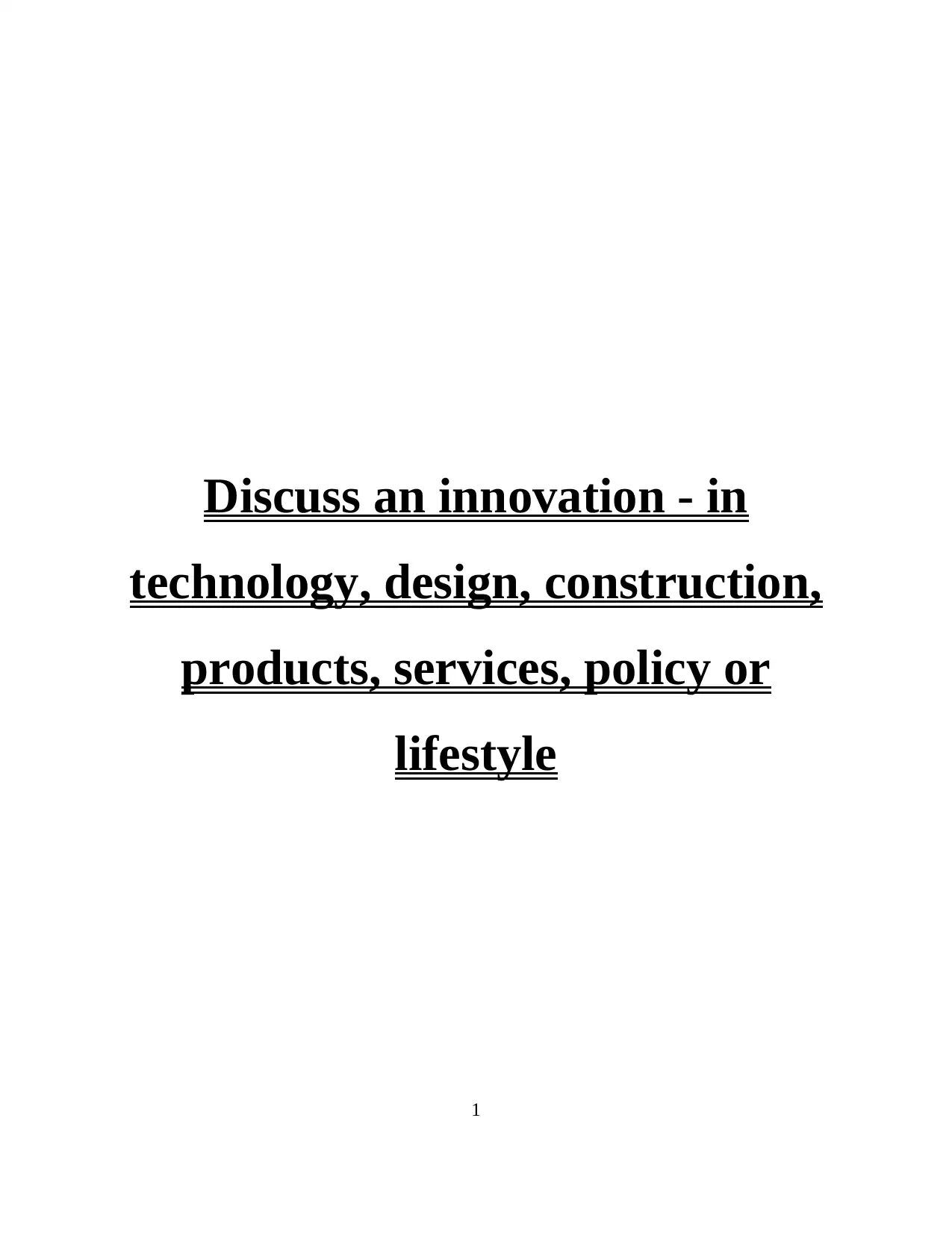
Discuss an innovation - in
technology, design, construction,
products, services, policy or
lifestyle
1
technology, design, construction,
products, services, policy or
lifestyle
1
Paraphrase This Document
Need a fresh take? Get an instant paraphrase of this document with our AI Paraphraser
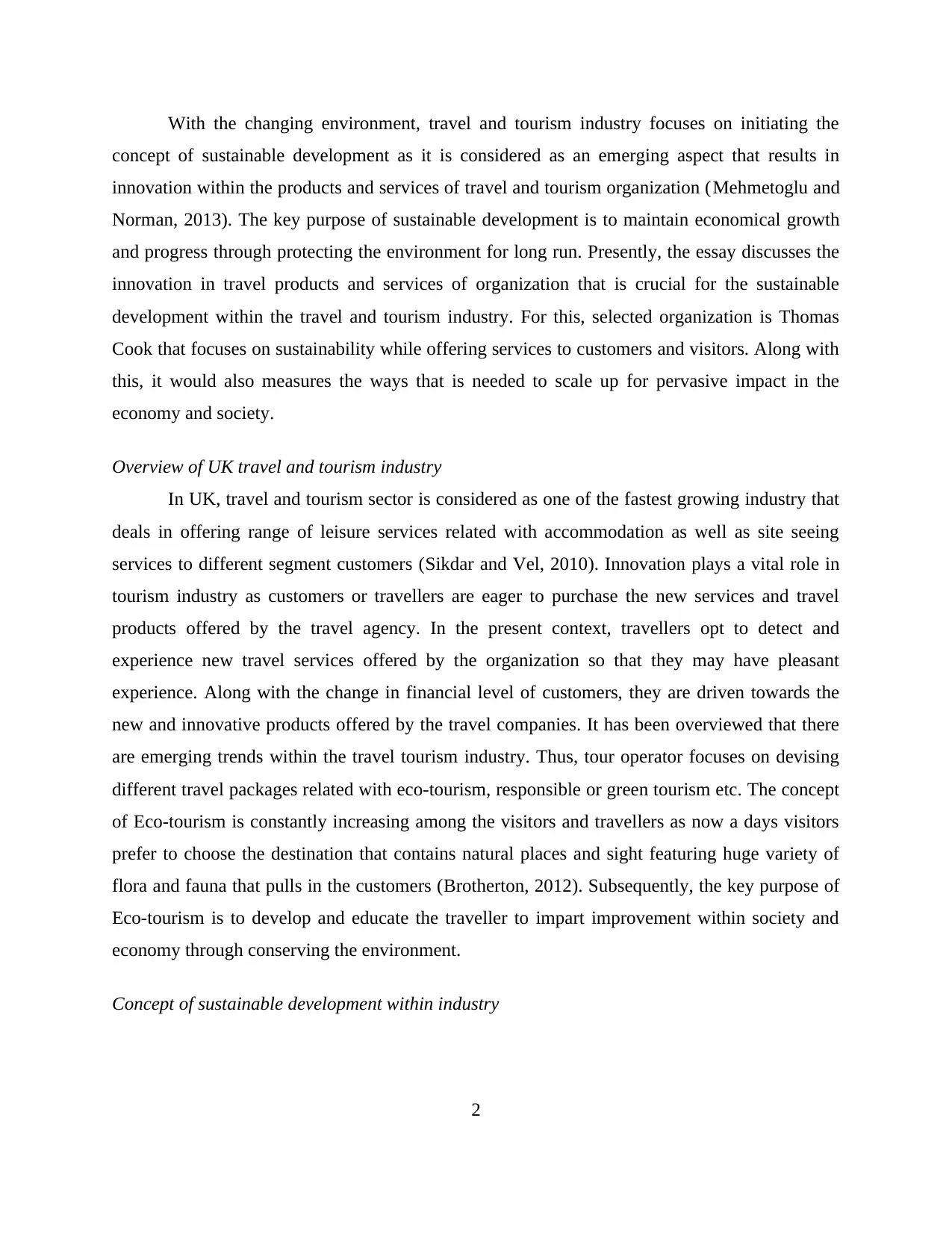
With the changing environment, travel and tourism industry focuses on initiating the
concept of sustainable development as it is considered as an emerging aspect that results in
innovation within the products and services of travel and tourism organization (Mehmetoglu and
Norman, 2013). The key purpose of sustainable development is to maintain economical growth
and progress through protecting the environment for long run. Presently, the essay discusses the
innovation in travel products and services of organization that is crucial for the sustainable
development within the travel and tourism industry. For this, selected organization is Thomas
Cook that focuses on sustainability while offering services to customers and visitors. Along with
this, it would also measures the ways that is needed to scale up for pervasive impact in the
economy and society.
Overview of UK travel and tourism industry
In UK, travel and tourism sector is considered as one of the fastest growing industry that
deals in offering range of leisure services related with accommodation as well as site seeing
services to different segment customers (Sikdar and Vel, 2010). Innovation plays a vital role in
tourism industry as customers or travellers are eager to purchase the new services and travel
products offered by the travel agency. In the present context, travellers opt to detect and
experience new travel services offered by the organization so that they may have pleasant
experience. Along with the change in financial level of customers, they are driven towards the
new and innovative products offered by the travel companies. It has been overviewed that there
are emerging trends within the travel tourism industry. Thus, tour operator focuses on devising
different travel packages related with eco-tourism, responsible or green tourism etc. The concept
of Eco-tourism is constantly increasing among the visitors and travellers as now a days visitors
prefer to choose the destination that contains natural places and sight featuring huge variety of
flora and fauna that pulls in the customers (Brotherton, 2012). Subsequently, the key purpose of
Eco-tourism is to develop and educate the traveller to impart improvement within society and
economy through conserving the environment.
Concept of sustainable development within industry
2
concept of sustainable development as it is considered as an emerging aspect that results in
innovation within the products and services of travel and tourism organization (Mehmetoglu and
Norman, 2013). The key purpose of sustainable development is to maintain economical growth
and progress through protecting the environment for long run. Presently, the essay discusses the
innovation in travel products and services of organization that is crucial for the sustainable
development within the travel and tourism industry. For this, selected organization is Thomas
Cook that focuses on sustainability while offering services to customers and visitors. Along with
this, it would also measures the ways that is needed to scale up for pervasive impact in the
economy and society.
Overview of UK travel and tourism industry
In UK, travel and tourism sector is considered as one of the fastest growing industry that
deals in offering range of leisure services related with accommodation as well as site seeing
services to different segment customers (Sikdar and Vel, 2010). Innovation plays a vital role in
tourism industry as customers or travellers are eager to purchase the new services and travel
products offered by the travel agency. In the present context, travellers opt to detect and
experience new travel services offered by the organization so that they may have pleasant
experience. Along with the change in financial level of customers, they are driven towards the
new and innovative products offered by the travel companies. It has been overviewed that there
are emerging trends within the travel tourism industry. Thus, tour operator focuses on devising
different travel packages related with eco-tourism, responsible or green tourism etc. The concept
of Eco-tourism is constantly increasing among the visitors and travellers as now a days visitors
prefer to choose the destination that contains natural places and sight featuring huge variety of
flora and fauna that pulls in the customers (Brotherton, 2012). Subsequently, the key purpose of
Eco-tourism is to develop and educate the traveller to impart improvement within society and
economy through conserving the environment.
Concept of sustainable development within industry
2
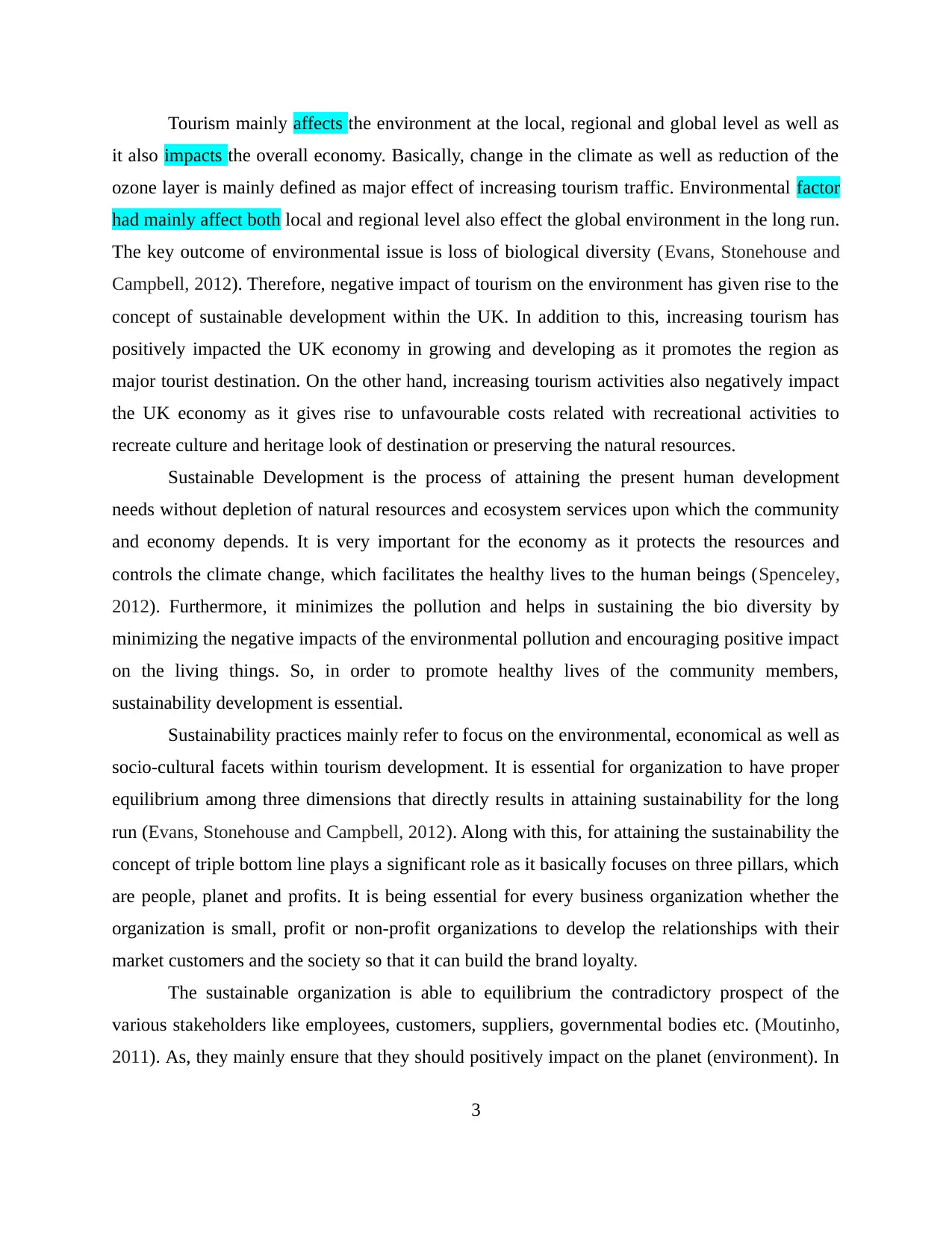
Tourism mainly affects the environment at the local, regional and global level as well as
it also impacts the overall economy. Basically, change in the climate as well as reduction of the
ozone layer is mainly defined as major effect of increasing tourism traffic. Environmental factor
had mainly affect both local and regional level also effect the global environment in the long run.
The key outcome of environmental issue is loss of biological diversity (Evans, Stonehouse and
Campbell, 2012). Therefore, negative impact of tourism on the environment has given rise to the
concept of sustainable development within the UK. In addition to this, increasing tourism has
positively impacted the UK economy in growing and developing as it promotes the region as
major tourist destination. On the other hand, increasing tourism activities also negatively impact
the UK economy as it gives rise to unfavourable costs related with recreational activities to
recreate culture and heritage look of destination or preserving the natural resources.
Sustainable Development is the process of attaining the present human development
needs without depletion of natural resources and ecosystem services upon which the community
and economy depends. It is very important for the economy as it protects the resources and
controls the climate change, which facilitates the healthy lives to the human beings (Spenceley,
2012). Furthermore, it minimizes the pollution and helps in sustaining the bio diversity by
minimizing the negative impacts of the environmental pollution and encouraging positive impact
on the living things. So, in order to promote healthy lives of the community members,
sustainability development is essential.
Sustainability practices mainly refer to focus on the environmental, economical as well as
socio-cultural facets within tourism development. It is essential for organization to have proper
equilibrium among three dimensions that directly results in attaining sustainability for the long
run (Evans, Stonehouse and Campbell, 2012). Along with this, for attaining the sustainability the
concept of triple bottom line plays a significant role as it basically focuses on three pillars, which
are people, planet and profits. It is being essential for every business organization whether the
organization is small, profit or non-profit organizations to develop the relationships with their
market customers and the society so that it can build the brand loyalty.
The sustainable organization is able to equilibrium the contradictory prospect of the
various stakeholders like employees, customers, suppliers, governmental bodies etc. (Moutinho,
2011). As, they mainly ensure that they should positively impact on the planet (environment). In
3
it also impacts the overall economy. Basically, change in the climate as well as reduction of the
ozone layer is mainly defined as major effect of increasing tourism traffic. Environmental factor
had mainly affect both local and regional level also effect the global environment in the long run.
The key outcome of environmental issue is loss of biological diversity (Evans, Stonehouse and
Campbell, 2012). Therefore, negative impact of tourism on the environment has given rise to the
concept of sustainable development within the UK. In addition to this, increasing tourism has
positively impacted the UK economy in growing and developing as it promotes the region as
major tourist destination. On the other hand, increasing tourism activities also negatively impact
the UK economy as it gives rise to unfavourable costs related with recreational activities to
recreate culture and heritage look of destination or preserving the natural resources.
Sustainable Development is the process of attaining the present human development
needs without depletion of natural resources and ecosystem services upon which the community
and economy depends. It is very important for the economy as it protects the resources and
controls the climate change, which facilitates the healthy lives to the human beings (Spenceley,
2012). Furthermore, it minimizes the pollution and helps in sustaining the bio diversity by
minimizing the negative impacts of the environmental pollution and encouraging positive impact
on the living things. So, in order to promote healthy lives of the community members,
sustainability development is essential.
Sustainability practices mainly refer to focus on the environmental, economical as well as
socio-cultural facets within tourism development. It is essential for organization to have proper
equilibrium among three dimensions that directly results in attaining sustainability for the long
run (Evans, Stonehouse and Campbell, 2012). Along with this, for attaining the sustainability the
concept of triple bottom line plays a significant role as it basically focuses on three pillars, which
are people, planet and profits. It is being essential for every business organization whether the
organization is small, profit or non-profit organizations to develop the relationships with their
market customers and the society so that it can build the brand loyalty.
The sustainable organization is able to equilibrium the contradictory prospect of the
various stakeholders like employees, customers, suppliers, governmental bodies etc. (Moutinho,
2011). As, they mainly ensure that they should positively impact on the planet (environment). In
3
⊘ This is a preview!⊘
Do you want full access?
Subscribe today to unlock all pages.

Trusted by 1+ million students worldwide
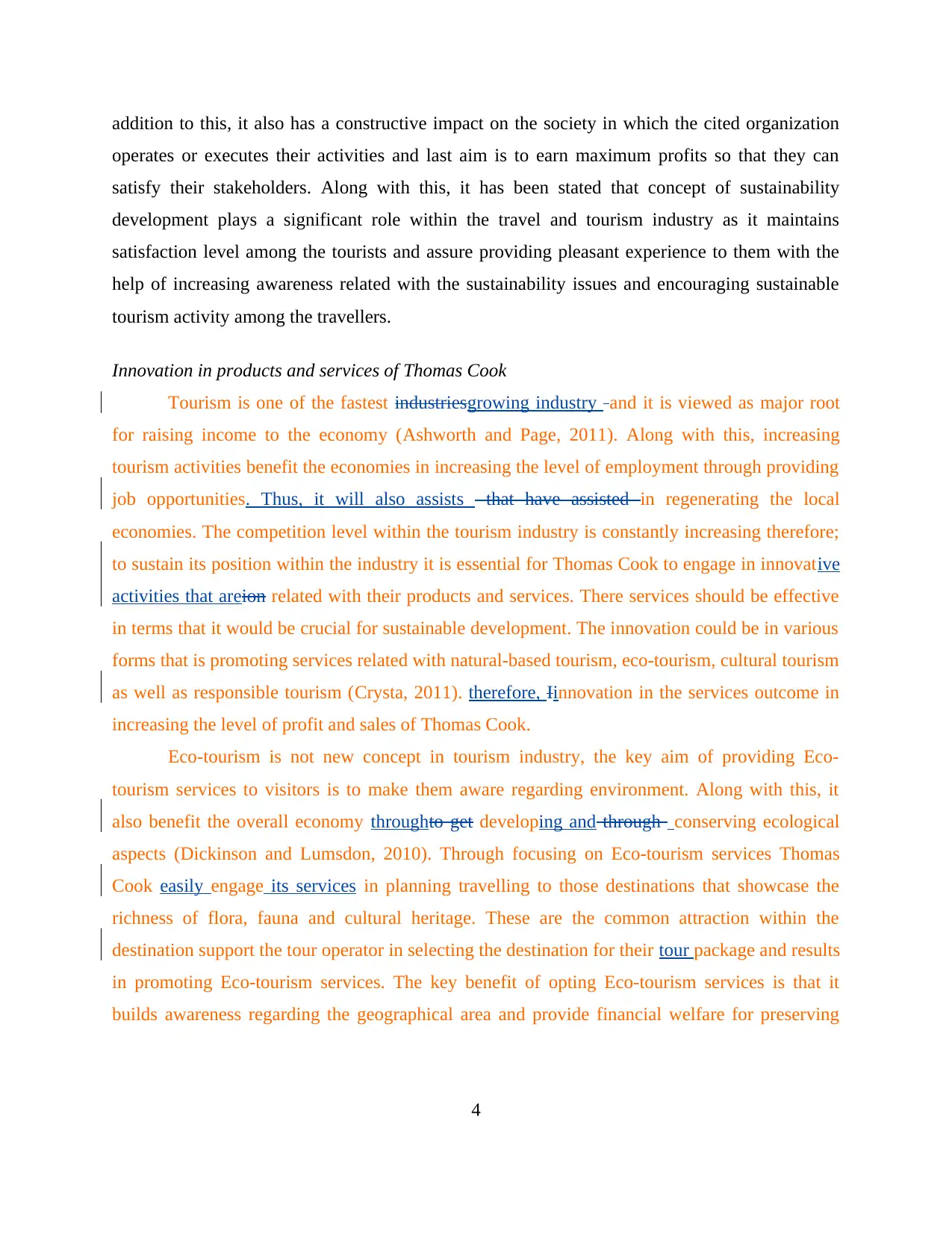
addition to this, it also has a constructive impact on the society in which the cited organization
operates or executes their activities and last aim is to earn maximum profits so that they can
satisfy their stakeholders. Along with this, it has been stated that concept of sustainability
development plays a significant role within the travel and tourism industry as it maintains
satisfaction level among the tourists and assure providing pleasant experience to them with the
help of increasing awareness related with the sustainability issues and encouraging sustainable
tourism activity among the travellers.
Innovation in products and services of Thomas Cook
Tourism is one of the fastest industriesgrowing industry and it is viewed as major root
for raising income to the economy (Ashworth and Page, 2011). Along with this, increasing
tourism activities benefit the economies in increasing the level of employment through providing
job opportunities. Thus, it will also assists that have assisted in regenerating the local
economies. The competition level within the tourism industry is constantly increasing therefore;
to sustain its position within the industry it is essential for Thomas Cook to engage in innovative
activities that areion related with their products and services. There services should be effective
in terms that it would be crucial for sustainable development. The innovation could be in various
forms that is promoting services related with natural-based tourism, eco-tourism, cultural tourism
as well as responsible tourism (Crysta, 2011). therefore, Iinnovation in the services outcome in
increasing the level of profit and sales of Thomas Cook.
Eco-tourism is not new concept in tourism industry, the key aim of providing Eco-
tourism services to visitors is to make them aware regarding environment. Along with this, it
also benefit the overall economy throughto get developing and through conserving ecological
aspects (Dickinson and Lumsdon, 2010). Through focusing on Eco-tourism services Thomas
Cook easily engage its services in planning travelling to those destinations that showcase the
richness of flora, fauna and cultural heritage. These are the common attraction within the
destination support the tour operator in selecting the destination for their tour package and results
in promoting Eco-tourism services. The key benefit of opting Eco-tourism services is that it
builds awareness regarding the geographical area and provide financial welfare for preserving
4
operates or executes their activities and last aim is to earn maximum profits so that they can
satisfy their stakeholders. Along with this, it has been stated that concept of sustainability
development plays a significant role within the travel and tourism industry as it maintains
satisfaction level among the tourists and assure providing pleasant experience to them with the
help of increasing awareness related with the sustainability issues and encouraging sustainable
tourism activity among the travellers.
Innovation in products and services of Thomas Cook
Tourism is one of the fastest industriesgrowing industry and it is viewed as major root
for raising income to the economy (Ashworth and Page, 2011). Along with this, increasing
tourism activities benefit the economies in increasing the level of employment through providing
job opportunities. Thus, it will also assists that have assisted in regenerating the local
economies. The competition level within the tourism industry is constantly increasing therefore;
to sustain its position within the industry it is essential for Thomas Cook to engage in innovative
activities that areion related with their products and services. There services should be effective
in terms that it would be crucial for sustainable development. The innovation could be in various
forms that is promoting services related with natural-based tourism, eco-tourism, cultural tourism
as well as responsible tourism (Crysta, 2011). therefore, Iinnovation in the services outcome in
increasing the level of profit and sales of Thomas Cook.
Eco-tourism is not new concept in tourism industry, the key aim of providing Eco-
tourism services to visitors is to make them aware regarding environment. Along with this, it
also benefit the overall economy throughto get developing and through conserving ecological
aspects (Dickinson and Lumsdon, 2010). Through focusing on Eco-tourism services Thomas
Cook easily engage its services in planning travelling to those destinations that showcase the
richness of flora, fauna and cultural heritage. These are the common attraction within the
destination support the tour operator in selecting the destination for their tour package and results
in promoting Eco-tourism services. The key benefit of opting Eco-tourism services is that it
builds awareness regarding the geographical area and provide financial welfare for preserving
4
Paraphrase This Document
Need a fresh take? Get an instant paraphrase of this document with our AI Paraphraser
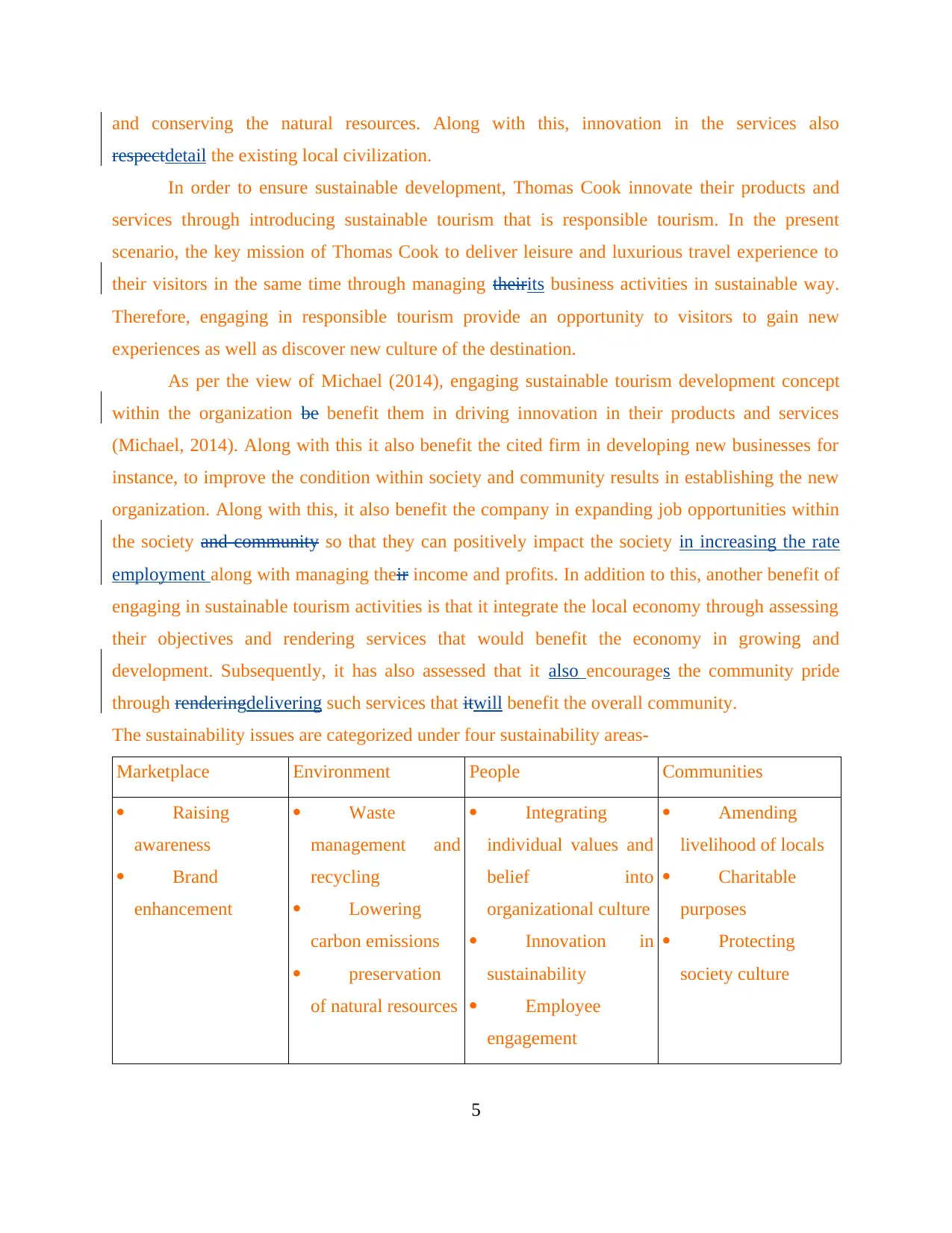
and conserving the natural resources. Along with this, innovation in the services also
respectdetail the existing local civilization.
In order to ensure sustainable development, Thomas Cook innovate their products and
services through introducing sustainable tourism that is responsible tourism. In the present
scenario, the key mission of Thomas Cook to deliver leisure and luxurious travel experience to
their visitors in the same time through managing theirits business activities in sustainable way.
Therefore, engaging in responsible tourism provide an opportunity to visitors to gain new
experiences as well as discover new culture of the destination.
As per the view of Michael (2014), engaging sustainable tourism development concept
within the organization be benefit them in driving innovation in their products and services
(Michael, 2014). Along with this it also benefit the cited firm in developing new businesses for
instance, to improve the condition within society and community results in establishing the new
organization. Along with this, it also benefit the company in expanding job opportunities within
the society and community so that they can positively impact the society in increasing the rate
employment along with managing their income and profits. In addition to this, another benefit of
engaging in sustainable tourism activities is that it integrate the local economy through assessing
their objectives and rendering services that would benefit the economy in growing and
development. Subsequently, it has also assessed that it also encourages the community pride
through renderingdelivering such services that itwill benefit the overall community.
The sustainability issues are categorized under four sustainability areas-
Marketplace Environment People Communities
Raising
awareness
Brand
enhancement
Waste
management and
recycling
Lowering
carbon emissions
preservation
of natural resources
Integrating
individual values and
belief into
organizational culture
Innovation in
sustainability
Employee
engagement
Amending
livelihood of locals
Charitable
purposes
Protecting
society culture
5
respectdetail the existing local civilization.
In order to ensure sustainable development, Thomas Cook innovate their products and
services through introducing sustainable tourism that is responsible tourism. In the present
scenario, the key mission of Thomas Cook to deliver leisure and luxurious travel experience to
their visitors in the same time through managing theirits business activities in sustainable way.
Therefore, engaging in responsible tourism provide an opportunity to visitors to gain new
experiences as well as discover new culture of the destination.
As per the view of Michael (2014), engaging sustainable tourism development concept
within the organization be benefit them in driving innovation in their products and services
(Michael, 2014). Along with this it also benefit the cited firm in developing new businesses for
instance, to improve the condition within society and community results in establishing the new
organization. Along with this, it also benefit the company in expanding job opportunities within
the society and community so that they can positively impact the society in increasing the rate
employment along with managing their income and profits. In addition to this, another benefit of
engaging in sustainable tourism activities is that it integrate the local economy through assessing
their objectives and rendering services that would benefit the economy in growing and
development. Subsequently, it has also assessed that it also encourages the community pride
through renderingdelivering such services that itwill benefit the overall community.
The sustainability issues are categorized under four sustainability areas-
Marketplace Environment People Communities
Raising
awareness
Brand
enhancement
Waste
management and
recycling
Lowering
carbon emissions
preservation
of natural resources
Integrating
individual values and
belief into
organizational culture
Innovation in
sustainability
Employee
engagement
Amending
livelihood of locals
Charitable
purposes
Protecting
society culture
5
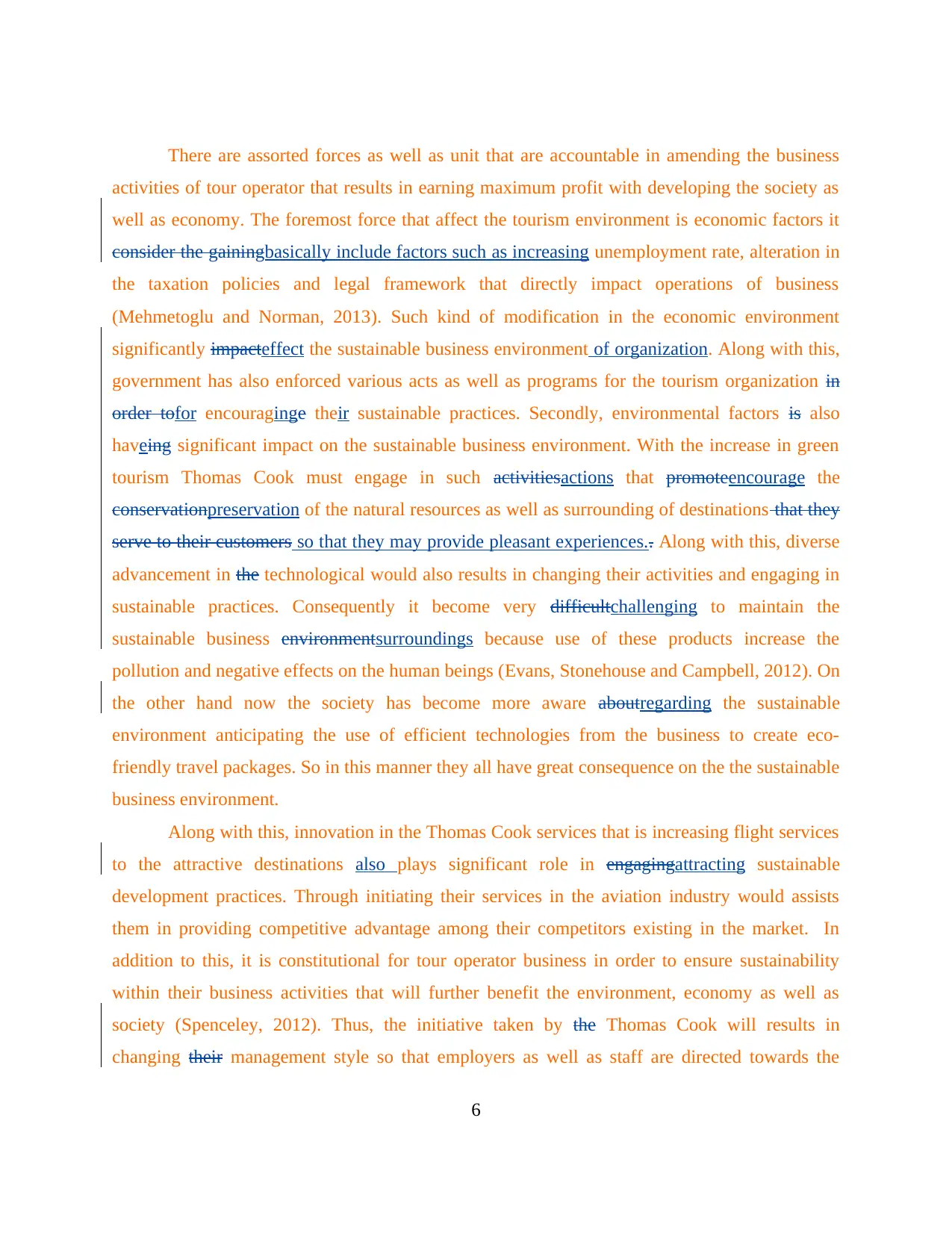
There are assorted forces as well as unit that are accountable in amending the business
activities of tour operator that results in earning maximum profit with developing the society as
well as economy. The foremost force that affect the tourism environment is economic factors it
consider the gainingbasically include factors such as increasing unemployment rate, alteration in
the taxation policies and legal framework that directly impact operations of business
(Mehmetoglu and Norman, 2013). Such kind of modification in the economic environment
significantly impacteffect the sustainable business environment of organization. Along with this,
government has also enforced various acts as well as programs for the tourism organization in
order tofor encouraginge their sustainable practices. Secondly, environmental factors is also
haveing significant impact on the sustainable business environment. With the increase in green
tourism Thomas Cook must engage in such activitiesactions that promoteencourage the
conservationpreservation of the natural resources as well as surrounding of destinations that they
serve to their customers so that they may provide pleasant experiences.. Along with this, diverse
advancement in the technological would also results in changing their activities and engaging in
sustainable practices. Consequently it become very difficultchallenging to maintain the
sustainable business environmentsurroundings because use of these products increase the
pollution and negative effects on the human beings (Evans, Stonehouse and Campbell, 2012). On
the other hand now the society has become more aware aboutregarding the sustainable
environment anticipating the use of efficient technologies from the business to create eco-
friendly travel packages. So in this manner they all have great consequence on the the sustainable
business environment.
Along with this, innovation in the Thomas Cook services that is increasing flight services
to the attractive destinations also plays significant role in engagingattracting sustainable
development practices. Through initiating their services in the aviation industry would assists
them in providing competitive advantage among their competitors existing in the market. In
addition to this, it is constitutional for tour operator business in order to ensure sustainability
within their business activities that will further benefit the environment, economy as well as
society (Spenceley, 2012). Thus, the initiative taken by the Thomas Cook will results in
changing their management style so that employers as well as staff are directed towards the
6
activities of tour operator that results in earning maximum profit with developing the society as
well as economy. The foremost force that affect the tourism environment is economic factors it
consider the gainingbasically include factors such as increasing unemployment rate, alteration in
the taxation policies and legal framework that directly impact operations of business
(Mehmetoglu and Norman, 2013). Such kind of modification in the economic environment
significantly impacteffect the sustainable business environment of organization. Along with this,
government has also enforced various acts as well as programs for the tourism organization in
order tofor encouraginge their sustainable practices. Secondly, environmental factors is also
haveing significant impact on the sustainable business environment. With the increase in green
tourism Thomas Cook must engage in such activitiesactions that promoteencourage the
conservationpreservation of the natural resources as well as surrounding of destinations that they
serve to their customers so that they may provide pleasant experiences.. Along with this, diverse
advancement in the technological would also results in changing their activities and engaging in
sustainable practices. Consequently it become very difficultchallenging to maintain the
sustainable business environmentsurroundings because use of these products increase the
pollution and negative effects on the human beings (Evans, Stonehouse and Campbell, 2012). On
the other hand now the society has become more aware aboutregarding the sustainable
environment anticipating the use of efficient technologies from the business to create eco-
friendly travel packages. So in this manner they all have great consequence on the the sustainable
business environment.
Along with this, innovation in the Thomas Cook services that is increasing flight services
to the attractive destinations also plays significant role in engagingattracting sustainable
development practices. Through initiating their services in the aviation industry would assists
them in providing competitive advantage among their competitors existing in the market. In
addition to this, it is constitutional for tour operator business in order to ensure sustainability
within their business activities that will further benefit the environment, economy as well as
society (Spenceley, 2012). Thus, the initiative taken by the Thomas Cook will results in
changing their management style so that employers as well as staff are directed towards the
6
⊘ This is a preview!⊘
Do you want full access?
Subscribe today to unlock all pages.

Trusted by 1+ million students worldwide
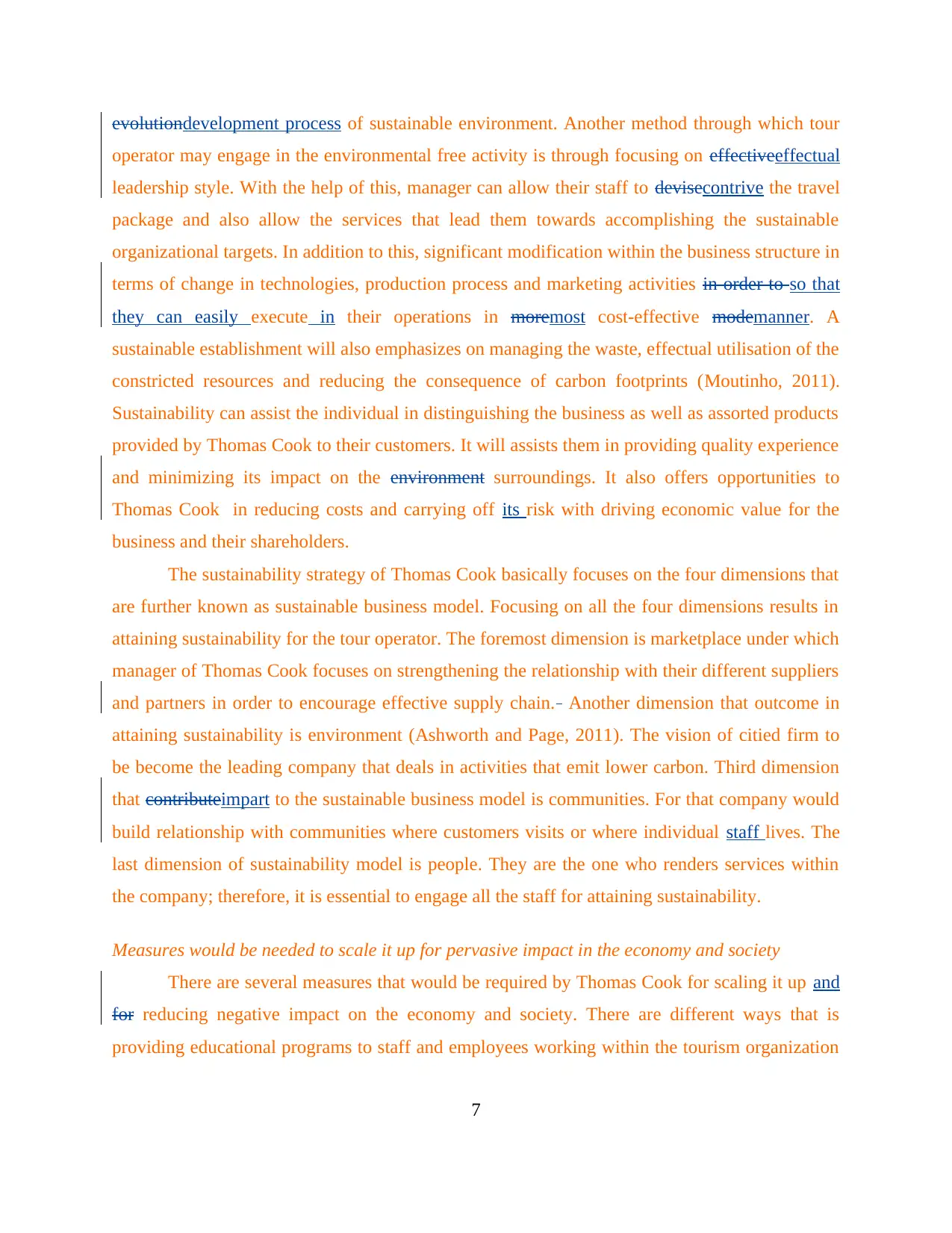
evolutiondevelopment process of sustainable environment. Another method through which tour
operator may engage in the environmental free activity is through focusing on effectiveeffectual
leadership style. With the help of this, manager can allow their staff to devisecontrive the travel
package and also allow the services that lead them towards accomplishing the sustainable
organizational targets. In addition to this, significant modification within the business structure in
terms of change in technologies, production process and marketing activities in order to so that
they can easily execute in their operations in moremost cost-effective modemanner. A
sustainable establishment will also emphasizes on managing the waste, effectual utilisation of the
constricted resources and reducing the consequence of carbon footprints (Moutinho, 2011).
Sustainability can assist the individual in distinguishing the business as well as assorted products
provided by Thomas Cook to their customers. It will assists them in providing quality experience
and minimizing its impact on the environment surroundings. It also offers opportunities to
Thomas Cook in reducing costs and carrying off its risk with driving economic value for the
business and their shareholders.
The sustainability strategy of Thomas Cook basically focuses on the four dimensions that
are further known as sustainable business model. Focusing on all the four dimensions results in
attaining sustainability for the tour operator. The foremost dimension is marketplace under which
manager of Thomas Cook focuses on strengthening the relationship with their different suppliers
and partners in order to encourage effective supply chain. Another dimension that outcome in
attaining sustainability is environment (Ashworth and Page, 2011). The vision of citied firm to
be become the leading company that deals in activities that emit lower carbon. Third dimension
that contributeimpart to the sustainable business model is communities. For that company would
build relationship with communities where customers visits or where individual staff lives. The
last dimension of sustainability model is people. They are the one who renders services within
the company; therefore, it is essential to engage all the staff for attaining sustainability.
Measures would be needed to scale it up for pervasive impact in the economy and society
There are several measures that would be required by Thomas Cook for scaling it up and
for reducing negative impact on the economy and society. There are different ways that is
providing educational programs to staff and employees working within the tourism organization
7
operator may engage in the environmental free activity is through focusing on effectiveeffectual
leadership style. With the help of this, manager can allow their staff to devisecontrive the travel
package and also allow the services that lead them towards accomplishing the sustainable
organizational targets. In addition to this, significant modification within the business structure in
terms of change in technologies, production process and marketing activities in order to so that
they can easily execute in their operations in moremost cost-effective modemanner. A
sustainable establishment will also emphasizes on managing the waste, effectual utilisation of the
constricted resources and reducing the consequence of carbon footprints (Moutinho, 2011).
Sustainability can assist the individual in distinguishing the business as well as assorted products
provided by Thomas Cook to their customers. It will assists them in providing quality experience
and minimizing its impact on the environment surroundings. It also offers opportunities to
Thomas Cook in reducing costs and carrying off its risk with driving economic value for the
business and their shareholders.
The sustainability strategy of Thomas Cook basically focuses on the four dimensions that
are further known as sustainable business model. Focusing on all the four dimensions results in
attaining sustainability for the tour operator. The foremost dimension is marketplace under which
manager of Thomas Cook focuses on strengthening the relationship with their different suppliers
and partners in order to encourage effective supply chain. Another dimension that outcome in
attaining sustainability is environment (Ashworth and Page, 2011). The vision of citied firm to
be become the leading company that deals in activities that emit lower carbon. Third dimension
that contributeimpart to the sustainable business model is communities. For that company would
build relationship with communities where customers visits or where individual staff lives. The
last dimension of sustainability model is people. They are the one who renders services within
the company; therefore, it is essential to engage all the staff for attaining sustainability.
Measures would be needed to scale it up for pervasive impact in the economy and society
There are several measures that would be required by Thomas Cook for scaling it up and
for reducing negative impact on the economy and society. There are different ways that is
providing educational programs to staff and employees working within the tourism organization
7
Paraphrase This Document
Need a fresh take? Get an instant paraphrase of this document with our AI Paraphraser
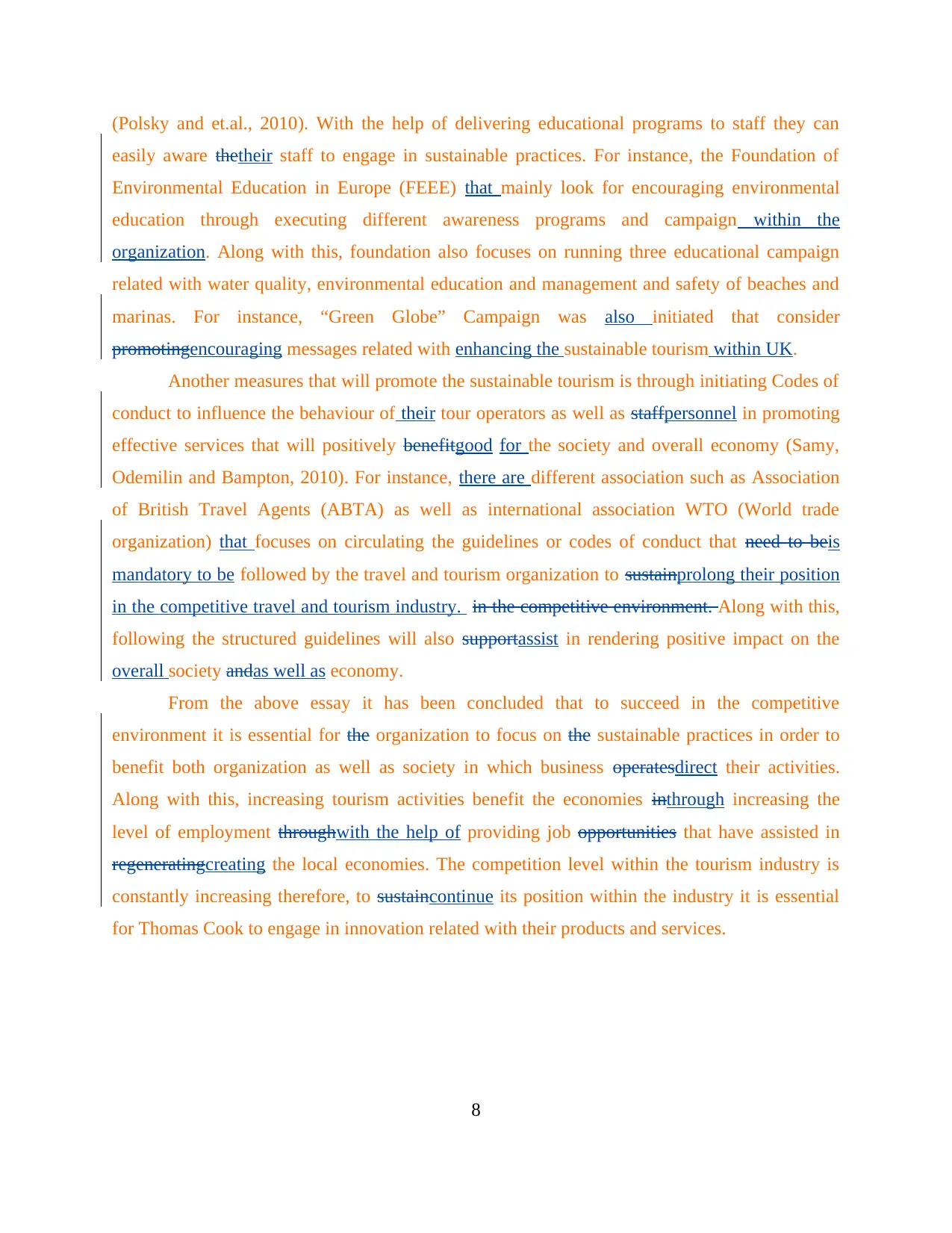
(Polsky and et.al., 2010). With the help of delivering educational programs to staff they can
easily aware thetheir staff to engage in sustainable practices. For instance, the Foundation of
Environmental Education in Europe (FEEE) that mainly look for encouraging environmental
education through executing different awareness programs and campaign within the
organization. Along with this, foundation also focuses on running three educational campaign
related with water quality, environmental education and management and safety of beaches and
marinas. For instance, “Green Globe” Campaign was also initiated that consider
promotingencouraging messages related with enhancing the sustainable tourism within UK.
Another measures that will promote the sustainable tourism is through initiating Codes of
conduct to influence the behaviour of their tour operators as well as staffpersonnel in promoting
effective services that will positively benefitgood for the society and overall economy (Samy,
Odemilin and Bampton, 2010). For instance, there are different association such as Association
of British Travel Agents (ABTA) as well as international association WTO (World trade
organization) that focuses on circulating the guidelines or codes of conduct that need to beis
mandatory to be followed by the travel and tourism organization to sustainprolong their position
in the competitive travel and tourism industry. in the competitive environment. Along with this,
following the structured guidelines will also supportassist in rendering positive impact on the
overall society andas well as economy.
From the above essay it has been concluded that to succeed in the competitive
environment it is essential for the organization to focus on the sustainable practices in order to
benefit both organization as well as society in which business operatesdirect their activities.
Along with this, increasing tourism activities benefit the economies inthrough increasing the
level of employment throughwith the help of providing job opportunities that have assisted in
regeneratingcreating the local economies. The competition level within the tourism industry is
constantly increasing therefore, to sustaincontinue its position within the industry it is essential
for Thomas Cook to engage in innovation related with their products and services.
8
easily aware thetheir staff to engage in sustainable practices. For instance, the Foundation of
Environmental Education in Europe (FEEE) that mainly look for encouraging environmental
education through executing different awareness programs and campaign within the
organization. Along with this, foundation also focuses on running three educational campaign
related with water quality, environmental education and management and safety of beaches and
marinas. For instance, “Green Globe” Campaign was also initiated that consider
promotingencouraging messages related with enhancing the sustainable tourism within UK.
Another measures that will promote the sustainable tourism is through initiating Codes of
conduct to influence the behaviour of their tour operators as well as staffpersonnel in promoting
effective services that will positively benefitgood for the society and overall economy (Samy,
Odemilin and Bampton, 2010). For instance, there are different association such as Association
of British Travel Agents (ABTA) as well as international association WTO (World trade
organization) that focuses on circulating the guidelines or codes of conduct that need to beis
mandatory to be followed by the travel and tourism organization to sustainprolong their position
in the competitive travel and tourism industry. in the competitive environment. Along with this,
following the structured guidelines will also supportassist in rendering positive impact on the
overall society andas well as economy.
From the above essay it has been concluded that to succeed in the competitive
environment it is essential for the organization to focus on the sustainable practices in order to
benefit both organization as well as society in which business operatesdirect their activities.
Along with this, increasing tourism activities benefit the economies inthrough increasing the
level of employment throughwith the help of providing job opportunities that have assisted in
regeneratingcreating the local economies. The competition level within the tourism industry is
constantly increasing therefore, to sustaincontinue its position within the industry it is essential
for Thomas Cook to engage in innovation related with their products and services.
8
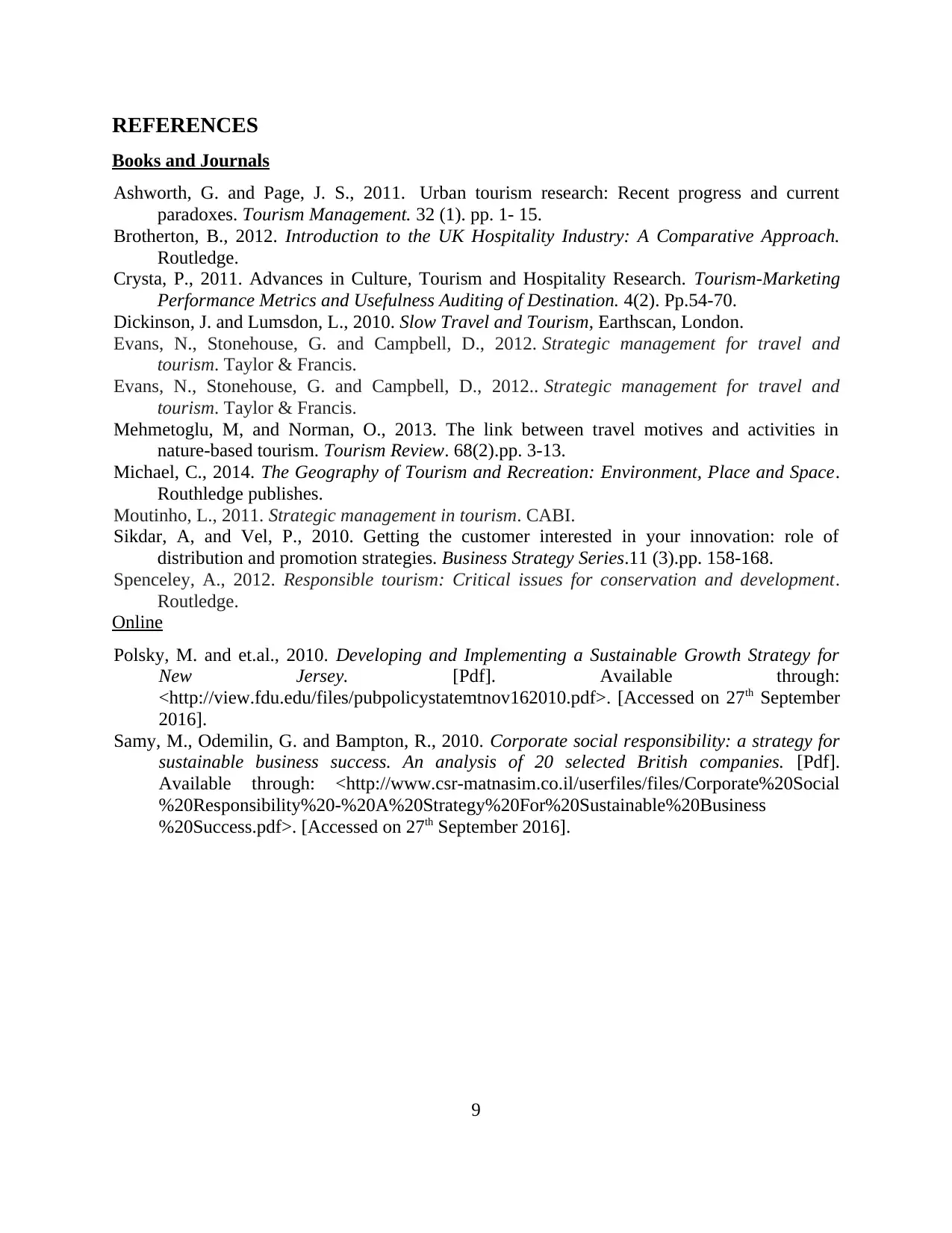
REFERENCES
Books and Journals
Ashworth, G. and Page, J. S., 2011. Urban tourism research: Recent progress and current
paradoxes. Tourism Management. 32 (1). pp. 1- 15.
Brotherton, B., 2012. Introduction to the UK Hospitality Industry: A Comparative Approach.
Routledge.
Crysta, P., 2011. Advances in Culture, Tourism and Hospitality Research. Tourism-Marketing
Performance Metrics and Usefulness Auditing of Destination. 4(2). Pp.54-70.
Dickinson, J. and Lumsdon, L., 2010. Slow Travel and Tourism, Earthscan, London.
Evans, N., Stonehouse, G. and Campbell, D., 2012. Strategic management for travel and
tourism. Taylor & Francis.
Evans, N., Stonehouse, G. and Campbell, D., 2012.. Strategic management for travel and
tourism. Taylor & Francis.
Mehmetoglu, M, and Norman, O., 2013. The link between travel motives and activities in
nature-based tourism. Tourism Review. 68(2).pp. 3-13.
Michael, C., 2014. The Geography of Tourism and Recreation: Environment, Place and Space.
Routhledge publishes.
Moutinho, L., 2011. Strategic management in tourism. CABI.
Sikdar, A, and Vel, P., 2010. Getting the customer interested in your innovation: role of
distribution and promotion strategies. Business Strategy Series.11 (3).pp. 158-168.
Spenceley, A., 2012. Responsible tourism: Critical issues for conservation and development.
Routledge.
Online
Polsky, M. and et.al., 2010. Developing and Implementing a Sustainable Growth Strategy for
New Jersey. [Pdf]. Available through:
<http://view.fdu.edu/files/pubpolicystatemtnov162010.pdf>. [Accessed on 27th September
2016].
Samy, M., Odemilin, G. and Bampton, R., 2010. Corporate social responsibility: a strategy for
sustainable business success. An analysis of 20 selected British companies. [Pdf].
Available through: <http://www.csr-matnasim.co.il/userfiles/files/Corporate%20Social
%20Responsibility%20-%20A%20Strategy%20For%20Sustainable%20Business
%20Success.pdf>. [Accessed on 27th September 2016].
9
Books and Journals
Ashworth, G. and Page, J. S., 2011. Urban tourism research: Recent progress and current
paradoxes. Tourism Management. 32 (1). pp. 1- 15.
Brotherton, B., 2012. Introduction to the UK Hospitality Industry: A Comparative Approach.
Routledge.
Crysta, P., 2011. Advances in Culture, Tourism and Hospitality Research. Tourism-Marketing
Performance Metrics and Usefulness Auditing of Destination. 4(2). Pp.54-70.
Dickinson, J. and Lumsdon, L., 2010. Slow Travel and Tourism, Earthscan, London.
Evans, N., Stonehouse, G. and Campbell, D., 2012. Strategic management for travel and
tourism. Taylor & Francis.
Evans, N., Stonehouse, G. and Campbell, D., 2012.. Strategic management for travel and
tourism. Taylor & Francis.
Mehmetoglu, M, and Norman, O., 2013. The link between travel motives and activities in
nature-based tourism. Tourism Review. 68(2).pp. 3-13.
Michael, C., 2014. The Geography of Tourism and Recreation: Environment, Place and Space.
Routhledge publishes.
Moutinho, L., 2011. Strategic management in tourism. CABI.
Sikdar, A, and Vel, P., 2010. Getting the customer interested in your innovation: role of
distribution and promotion strategies. Business Strategy Series.11 (3).pp. 158-168.
Spenceley, A., 2012. Responsible tourism: Critical issues for conservation and development.
Routledge.
Online
Polsky, M. and et.al., 2010. Developing and Implementing a Sustainable Growth Strategy for
New Jersey. [Pdf]. Available through:
<http://view.fdu.edu/files/pubpolicystatemtnov162010.pdf>. [Accessed on 27th September
2016].
Samy, M., Odemilin, G. and Bampton, R., 2010. Corporate social responsibility: a strategy for
sustainable business success. An analysis of 20 selected British companies. [Pdf].
Available through: <http://www.csr-matnasim.co.il/userfiles/files/Corporate%20Social
%20Responsibility%20-%20A%20Strategy%20For%20Sustainable%20Business
%20Success.pdf>. [Accessed on 27th September 2016].
9
⊘ This is a preview!⊘
Do you want full access?
Subscribe today to unlock all pages.

Trusted by 1+ million students worldwide
1 out of 9
Related Documents
Your All-in-One AI-Powered Toolkit for Academic Success.
+13062052269
info@desklib.com
Available 24*7 on WhatsApp / Email
![[object Object]](/_next/static/media/star-bottom.7253800d.svg)
Unlock your academic potential
Copyright © 2020–2026 A2Z Services. All Rights Reserved. Developed and managed by ZUCOL.





